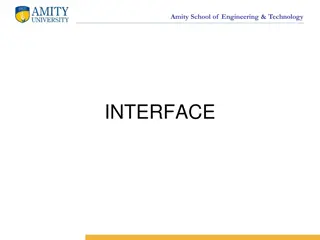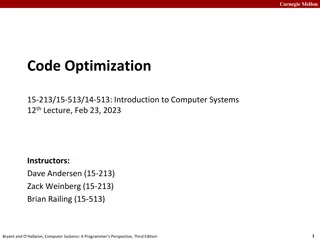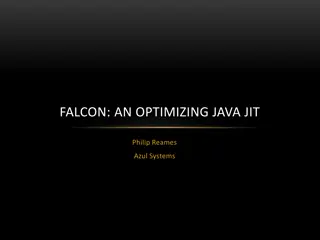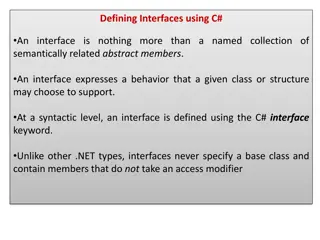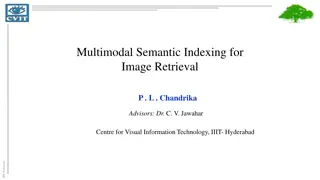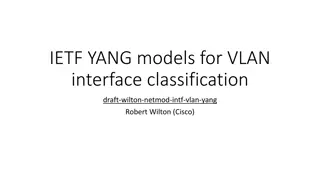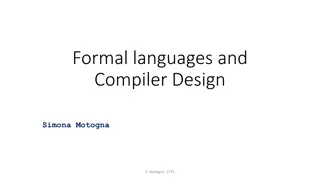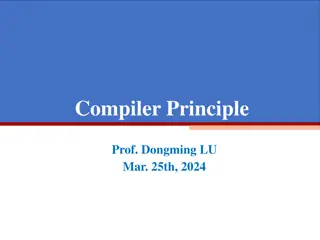Enhancing Chapel Compiler with Interfaces and Semantic Changes
Explore the evolution of Chapel compiler with the integration of interfaces, semantic modifications, and improvements in error messages. Delve into the concepts of constrained generics, function call hijacking prevention, and the impact on compiler efficiency.
Download Presentation

Please find below an Image/Link to download the presentation.
The content on the website is provided AS IS for your information and personal use only. It may not be sold, licensed, or shared on other websites without obtaining consent from the author. Download presentation by click this link. If you encounter any issues during the download, it is possible that the publisher has removed the file from their server.
E N D
Presentation Transcript
Towards Interfaces for Chapel Chris Wailes and Jeremy Siek
Why interfaces How interfaces Semantic changes Compiler changes Improving the compiler
Why interfaces How interfaces Semantic changes Compiler changes Improving the compiler
Error messages are improved 1 use Sort; 2 class C { } 3 var A : [1..10] C; 4 QuickSort(A); /modules/standard/Sort.chpl:58: In function 'InsertionSort': /modules/standard/Sort.chpl:64: error: unresolved call '<(C, C)' /modules/internal/ChapelBase.chpl:326: note: candidates are: <(a: string, b: string) SortExample.chpl:4: Type C does not implement the Comparable interface
Constrained generics can be checked eagerly proc InsertionSort(Data: [?Dom](?T)) { const lo = Dom.low; for i in Dom { const ithVal : T = Data(i); var inserted = false; for j in lo..i-1 by -1 { if (ithVal < Data(j)) { Data(j+1) = Data(j); } else { Data(j+1) = ithVal; inserted = true; break; } } if (!inserted) { Data(lo) = ithVal; } } } error: unresolved call <(T, T)
Constrained generics can be checked eagerly proc InsertionSort(Data: [?Dom](?T)) where implements LessThan(T) { const lo = Dom.low; for i in Dom { const ithVal : T = Data(i); var inserted = false; for j in lo..i-1 by -1 { if (ithVal < Data(j)) { Data(j+1) = Data(j); } else { Data(j+1) = ithVal; inserted = true; break; } } if (!inserted) { Data(lo) = ithVal; } } } Resolves to function defined in LessThan interface
Function call hijacking is prevented module M1 { proc helper() { writeln( hello, world! ); } proc print_hello_world(x) { helper(); } } you ve been hello, world! hijacked! proc helper() { writeln( you ve been hijacked! ); } proc main() { M1.print_hello_world(42); }
Compiler has less work to do Unconstrained Constrained proc foo(x : T } ) { proc foo(x : T ) { } proc foo(x : int) { } proc foo(x : int) { } proc foo(x : double) { } proc foo(x : double) { } proc foo(x : string) { } proc foo(x : string) { } proc foo(x : Car) { } proc foo(x : Car) { } proc foo(x : Account) { } proc foo(x : Account) { }
Why interfaces How interfaces Semantic changes Compiler changes Improving the compiler
Interfaces place requirements on types interface Monoid(T) { proc binary_op(x:T, y:T):T; proc identity_element():T; } interface Comparable(T) { proc <(x:T, y:T):bool; proc >(x:T, y:T):bool; proc ==(x:T, y:T):bool; }
Implements statements check a type against an interface s requirements interface Monoid(T) { proc binary_op(x:T, y:T):T; proc identity_element():T; } proc binary_op(x:int, y:int):int { return x + y; } proc identity_element():int { return 0; } implements Monoid(int);
Interfaces allow us to resolve generics without instantiation interface Loggable(T) { proc getID(T):int; proc getMessage(T):string; } proc processEvent(events : [](?T)) where implements Loggable(T), Runnable(T) { for i in 1..events.size { var event : T = events(i); var id : int = getID(event); var message : string = getMessage(event); interface Runnable(T) { proc run(T):bool; } proc runEvent(event : ?T) where implements Runnable(T) { } if (runEvent(event)) { logEvent(id, message); } proc logEvent(id : int, } } message : string) { }
Eager resolution prevents function call hijacking module M1 { proc helper() { writeln( hello, world! ); } proc print_hello_world(x) { helper(); } } proc helper() { writeln( you ve been hijacked! ); } proc main() { M1.print_hello_world(42); }
Why interfaces How interfaces Semantic changes Compiler changes Improving the compiler
Constrained generics are prefered over unconstrained generics proc logEvents(e:[](?T)) where implements Loggable(T) { } proc logEvents(e:[](?T)) { } logEvents(getEvents());
Constraints cant increase proc logEvents(l : Log, events : [](?U)) where proc logEvents(l : Log, events : [](?U)) where proc logEvents(l : Log, events : [](?U)) where implements Loggable(U); implements Loggable(U), Runnable(U); implements Loggable(U), Runnable(U), Copyable(U); proc processEvents(l : Log, events : [](?T)) where implements Loggable(T), Runnable(T) { for i in i..events.size { run(events(i)); } logEvents(l, events); }
Unconstrained generics gain the caller s constraints proc logEvents(l : Log, events : [](?U)); proc logEvents(l : Log, events : [](?U)) where implements Loggable(U), Runnable(U); proc processEvents(l : Log, events : [](?T)) where implements Loggable(T), Runnable(T) { for i in i..events.size { run(events(i)); } logEvents(l, events); }
Implementations are passed from one generic to the next module A { interface Incrementable(T) { proc inc(x:T):T; } proc inc(x:int):int { return x + 100; } implements Incrementable(int); proc helper(x:?T) where implements Incrementable(T) { return inc(x); } proc incOuter(x:?T) where implements Incrementable(T) { return helper(x); } } proc inc(x:int):int { return x + 2; } implements A.Incrementable(int); A.incOuter(40); 42
Why interfaces How interfaces Semantic changes Compiler changes Improving the compiler
Implements statements cause implementations to be built interface Foo(T) { proc foo(a:T):T; proc zap(a:T, b:T):bool; } implementation Foo(int) { [0]: [1]: } 0x6542f0 0x6c3570 proc foo(a:int):int { } proc zap(a:int, b:int):bool { } implements Foo(int);
Calls can resolve to implementation slots proc constrainedGeneric(x:T, y:U) where implements Foo(T), Bar(U) { [0][0] interface Foo(T) { proc foo(a:T):T; proc zap(a:T, b:T):bool; } foo(x); [1][0] bar(y); zap(x, x); interface Bar(U) { proc bar(x:U):U; proc baf(x:U, y:int):int; } [0][1] baf(y, 42); [1][1] } bar(x); Unresolved call
Specialization replaces implementation slots with pointers T int U real where implements Foo(T), Bar(U) proc constrainedGeneric(x: , y: ) implements Foo(int); implementation Foo(int) { [0]: 0x6542f0 [1]: 0x6c3570 } { [0][0] 0x6542f0 foo(x); [1][0] 0x8281e0 bar(y); implements Bar(real); implementation Bar(real) { [0]: 0x8281e0 [1]: 0x6b8e20 } [0][1] 0x6c3570 zap(x, x); baf(y, 42); [1][1] 0x6b8e20 constrainedGeneric(42, 100.0); constrainedGeneric(42, 100.0); }
Why interfaces How interfaces Semantic changes Compiler changes Improving the compiler
The Chapel compiler has room for improvement Function Resolution: 6841 SLOC! Large and complicated passes Mixing of subtyping and tagging Poorly documented invariants spread across large sections of code Using common C++ idioms and STL classes would make life easier
Chapel mixes subtyping and tagging isFnSymbol(node) fnSymbol->hasFlag(FLAG_GENERIC) aggregateType->aggregateTag == AGGRAGATE_CLASS
More subtyping would result in less memory usage FnSymbol* instantiatedFrom; SymbolMap substitutions; BlockStmt* instantiationPoint; SymbolMap partialCopyMap; FnSymbol* partialCopySource; Symbol* retSymbol; int numPreTupleFormals;
Invariants are not well documented breakInvariant(); Copying a node does not result in a well-formed AST remove_help doesn t adjust a node s list member intermediateCall(); call(); intermediateCall(); breakAndFixInvariant(); intermediateCall(); call(); fixInvariant();
Invariant tracking is time consuming and difficult
Using common C++ idioms and STL classes makes life easier Copy constructors operator[] Iterators vector, map, and list Methods over functions
Towards interfaces for Chapel Improved programmer experience New behaviours for constrained generics Function resolution in the presence of type variables Suggested improvement to the compiler Questions?


